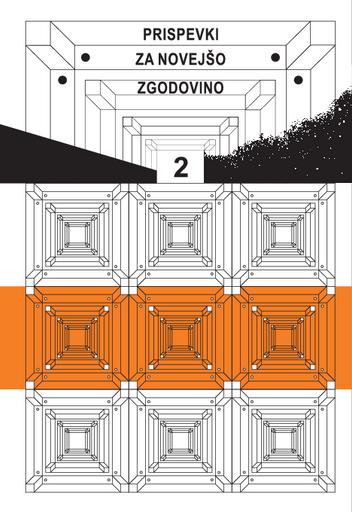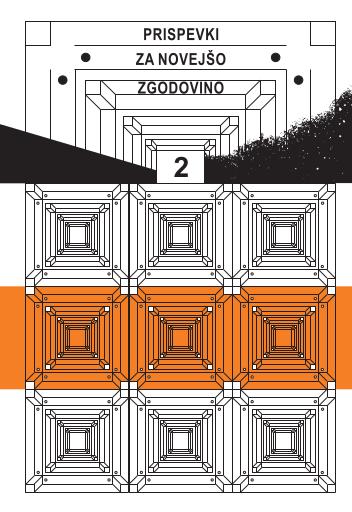
/
Serijske publikacije
/
Prispevki za novejšo zgodovino
Tradicija Josipa Jurčiča na Muljavi: meje lokalizma in nacionalizma

Avtor(ji):Marko Zajc
Soavtor(ji):Zdenko Čepič (odg. ur.), Damijan Guštin (gl. ur.), Borut Praper (prev.), Bojana Samarin (lekt.)
Leto:2013
Založnik(i):Inštitut za novejšo zgodovino, Ljubljana
Jezik(i):angleščina
Vrst(e) gradiva:besedilo
Ključne besede:Slovenija, 17. stoletje, narod, nacionalizem, Muljava, Josip Jurčič, lokalni patriotizem, Slovenia, 17. century, nation, nationalism, Muljava, Josip Jurčič, local patriotism
Avtorske pravice:

To delo avtorja Marko Zajc je ponujeno pod Creative Commons Priznanje avtorstva-Nekomercialno-Brez predelav 4.0 Mednarodna
Datoteke (1)

Ime:Prispevki_za_novejso_zgodovino_2013-2.pdf
Velikost:2.93MB
Format:application/pdf
Stalna povezava:https://hdl.handle.net/11686/file18346
Opis
With the example of an amateur theatre in a Slovenian village the author demonstrates that the adherence to the local community has a significant role in the establishment of everyday nationhood, especially in the communities not bordering on »others«. The writer and patriot Josip Jurčič (1844-1881) was born in the village of Muljava. In 1911 patriotic students organised the theatre staging of Jurčič’s novel for the first time. The performances, featuring »ordinary people« speaking the local dialect, became a traditional village activity. The villagers are active and creative in cultivating a memory. The identification with the significance of »our« man in the national mythology increases the importance of the village. The organisation of rituals is an important volunteer activity, which brings the village community together. The organisation of village rituals simultaneously represents the organisation of national rituals. The adherence to the local community outgrows itself. On one hand it is concrete and the members confirm it with joint activities, while on the other hand it is placed in a wider national context. The changes in the state related and ideological context (Austro Hungary, the First Yugoslavia, the socialist Yugoslavia, Slovenia) contribute to the shaping of the village rituals. Various nation building groups attempt to approximate the local patriotic nationhood to their own versions of the national ideologies. A constant misunderstanding exists between the local patriotic nationhood and the nationhood of the elites. A successful nationalism is a misunderstanding that »works«. The author’s thesis is based on the exploration of archive, newspaper and oral sources.
Metapodatki (12)
- identifikatorhttps://hdl.handle.net/11686/34922
- naslov
- Tradicija Josipa Jurčiča na Muljavi: meje lokalizma in nacionalizma
- Josip Jurčič’s Tradition in Muljava: The Boundaries of Localism and Nationalism
- avtor
- Marko Zajc
- soavtor
- Zdenko Čepič (odg. ur.)
- Damijan Guštin (gl. ur.)
- Borut Praper (prev.)
- Bojana Samarin (lekt.)
- predmet
- Slovenija
- 17. stoletje
- narod
- nacionalizem
- Muljava
- Josip Jurčič
- lokalni patriotizem
- Slovenia
- 17. century
- nation
- nationalism
- Muljava
- Josip Jurčič
- local patriotism
- opis
- Avtor na primeru amaterskega gledališča v slovenski vasi prikazuje, da ima privrženost lokalni skupnosti veliko vlogo pri oblikovanju vsakdanjega nacionalizma, še zlasti v skupnostih, ki ne ležijo na meji z »drugimi.« V vasi Muljava se je rodil pisatelj Josip Jurčič (1844-1881). Leta 1911 so nacionalistični študenti v vasi prvič organizirali odrsko uprizoritev Jurčičevega romana. Predstave, v katerih igrajo »navadni ljudje« v lokalnem narečju, so postale tradicionalna vaška dejavnost. Da bi ostala zavest o osebnosti živa, mora biti lokalna skupnost aktivna in kreativna pri kultiviranju spomina. Identifikacija s pomenom »našega« človeka v nacionalni mitologiji, poveča pomen vasi v ideološkem nacionalnem prostoru. Organizacija ritualov je pomembna prostovoljna dejavnost, ki povezuje vaško skupnost. Opravljanje vaških ritualov je istočasno opravljanje nacionalnih ritualov. Privrženost lokalni skupnosti preraste samo sebe. Po eni strani je konkretna in jo člani potrjujejo s skupnimi aktivnostmi, po drugi strani pa je postavljena v širši, nacionalni kontekst. Čeprav lokalpatriotski nacionalizem, ki so ga spodbudile elite, za reprodukcijo več ne potrebuje elit, obstajajo žive vezi z elitnim nacionalizmom. Spremembe državnega in ideološkega konteksta (Avstro-Ogrska, prva Jugoslavija, socialistična Jugoslavija, Slovenija) sooblikujejo vaške rituale. Različne narodotvorne skupine poskušajo lokalpatriotski nacionalizem približati svoji verziji nacionalne ideologije. Med vsakdanjim nacionalizmom in nacionalizmom elit je konstanten nesporazum. Uspešen nacionalizem je nesporazum, ki »deluje«. Avtorjeva teza temelji na raziskavi arhivskih, časopisnih in ustnih virov.
- With the example of an amateur theatre in a Slovenian village the author demonstrates that the adherence to the local community has a significant role in the establishment of everyday nationhood, especially in the communities not bordering on »others«. The writer and patriot Josip Jurčič (1844-1881) was born in the village of Muljava. In 1911 patriotic students organised the theatre staging of Jurčič’s novel for the first time. The performances, featuring »ordinary people« speaking the local dialect, became a traditional village activity. The villagers are active and creative in cultivating a memory. The identification with the significance of »our« man in the national mythology increases the importance of the village. The organisation of rituals is an important volunteer activity, which brings the village community together. The organisation of village rituals simultaneously represents the organisation of national rituals. The adherence to the local community outgrows itself. On one hand it is concrete and the members confirm it with joint activities, while on the other hand it is placed in a wider national context. The changes in the state related and ideological context (Austro Hungary, the First Yugoslavia, the socialist Yugoslavia, Slovenia) contribute to the shaping of the village rituals. Various nation building groups attempt to approximate the local patriotic nationhood to their own versions of the national ideologies. A constant misunderstanding exists between the local patriotic nationhood and the nationhood of the elites. A successful nationalism is a misunderstanding that »works«. The author’s thesis is based on the exploration of archive, newspaper and oral sources.
- založnik
- Inštitut za novejšo zgodovino
- datum
- 2013
- tip
- besedilo
- jezik
- Angleščina
- jeDelOd
- pravice
- licenca: ccByNcNd
Seznam literature v delu (34)
| Stran | Avtor | Naslov | Vir | Kraj | Založba | Leto |
|---|---|---|---|---|---|---|
| 24 | Benedict, Anderson | Zamišljene skupnosti | Ljubljana | 2007 | ||
| 24 | Ernest, Gellner | Nationalism | Phoenix | 1997 | ||
| 25 | Mouzelis, Nicos | Nationalism, Restructing Gellner’s Theory | Ernest Gellner and Contemporary Social Thought | Cambridge | 2007 | |
| 25 | Hroch, Miroslav | Društveni preduvjeti nacionalnih preporoda u Europi | Zagreb | 2006 | ||
| 25 | Smith, Anthony D. | Nacionalizem – Teorija, ideologija, zgodovina | Ljubljana | 2005 | ||
| 25 | O’Leary, Brendan | On the Nature of Nationalism: An Appraisal of Ernest Gellner’s Writings on Nationalism | British Journal of Political Science | 1997 | ||
| 25 | Brubaker, Rogers | Ethnicity Without Groups | Harvard | 2004 | ||
| 25 | Brubaker, Rogers | Ethnicity Without Groups | Archives européennes de sociologie | 2002 | ||
| 25 | Jenkins, Richard | Social Identity, Third Edition | Routledge | 2008 | ||
| 26 | Brubaker Rogers et, al. | Nationalist Politics and Everyday Ethnicity in a Transylvanian Town | Oxford | Princeton | 2007 | |
| 26 | Fox, Jon E. ; Miller Idriss, Cynthia | Everyday Nationhood | Ethnicities | 2008 | ||
| 26 | Smith, Anthony | The Limits of Everyday Nationhood | Ethnicities | 2008 | ||
| 26 | Fox, Jon E. ; Miller-Idriss, Cynthia | Everyday Nationhood | Ethnicities | 2008 | ||
| 27 | Kann, Robert A. | The Multinational Empire, Nationalism and National Reform in the Habsburg Monarchy 1848 – 1918, Volume 1. | New York | 1964 | ||
| 27 | Vodopivec, Peter | Od Pohlinove slovnice do samostojne države. Slovenska zgodovina od konca 18. do konca 20. stoletja | Ljubljana | 2006 | ||
| 27 | Rumpler, Helmut | Österreichische Geschichte 1804–1914. Eine Chance für Mitteleuropa, Bürgerliche Emazipation und Staatsverfall in der Habsburgermonarchie | Wien | 1997 | ||
| 27 | Hroch, Miroslav | Can Nation-Forming Processes Be Used as a Criterion of Uneven Development | Criteria and Indicators of Backwardness, Essays on Uneven Development in European History | Prague | 1996 | |
| 28 | Melik, Vasilij | Leto 1848 v slovenski zgodovini | Slovenci 1848-1918 | Maribor | 2002 | |
| 28 | Zajc, Marko | Jugoslovanstvo pri Slovencih v kontekstu sosednjih »združevalnih« nacionalnih ideologij | Evropski vplivi na slovensko družbo | Ljubljana | 2008 | |
| 29 | Prijatelj, Ivan | Slovenska kulturnopolitična in slovstvena zgodovina 1848-1895 | Ljubljana | 1958 | ||
| 29 | Matić, Dragan | Nemci v Ljubljani 1861-1918 | Ljubljana | 2002 | ||
| 29 | Jurčič, Josip | Jurij Kozjak – slovenski janičar. Jurčičevih izbranih spisov II. | Ljubljana | 1920 | ||
| 30 | Melik, Vasilij | Slovenska politika v Taaffejevi dobi | Slovenci 1848-1918 | Maribor | 2002 | |
| 30 | Smith Anthony, D. | The Resurgence of Nationalism? Myth and Memory in the Renewal of Nations | The British Journal of Sociology | 1996 | ||
| 30 | Glavan, Mihael | Velika Jurčičeva slavnost na Muljavi, 15 August 1882 | Jurčič naš sopotnik | Grosuplje | 1994 | |
| 31 | Zupančič, Danijel | Kulturno delovanje amaterskega gledališča na Muljavi v obdobju 1921-1941 | Zbornik občin Grosuplje, Ivančna gorica, Dobrepolje XXII. | Grosuplje | 2002 | |
| 31 | Dolenc, Ervin | Kultura 1918-1941 | Slovenska novejša zgodovina I. | Ljubljana | 2005 | |
| 31 | Debeljak, Anton | Jurčič v srednješolskih učbenikih in še nekaj | Življenje in svet | 1934 | ||
| 31 | Jurčič, Ciril | Zgodovina prostovoljnega gasilskega društva Muljava | Muljava | 1994 | ||
| 32 | Melik, Vasilij | Volitve 1907-1927 na današnjem Grosupeljskem ozemlju | Zbornik občine Grosuplje 1974 | Grosuplje | 1974 | |
| 32 | Zupančič, Danijel | Kulturno delovanje amaterskega gledališča na Muljavi v obdobju 1921-1941 | Zbornik občin Grosuplje, Ivančna gorica, Dobrepolje XXII. | Grosuplje | 2002 | |
| 33 | Jurčič, Ciril | Pajžbarjev rod | Muljava | 2004 | ||
| 33 | Pretnar, Bogi | Klic Jurčičevine | Jurčič naš sopotnik | Grosuplje | 1994 | |
| 34 | Hobsbawm, Eric | Introduction: Inventing Traditions. The Invention of Tradition | Cambridge | 2008 |